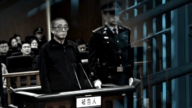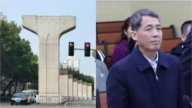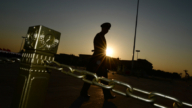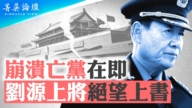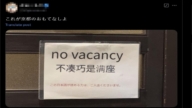【新唐人2013年11月19日訊】中共十八屆三中全會除了決定所謂改革議題外,會後也決定了新的人事佈局。其中,公告明確中紀委書記王歧山對地方政府和中央各部委的監控權,也就是變相的控制了中共官員的任命權。而「國家安全委員會」已基本確定由中共黨魁習近平親自掛帥擔任組長﹔另一個「全面深化改革領導小組」,外界認為將由中共總理李克強兼任組長一職。王岐山和習近平、李克強構成鐵三角,在中國社會公開亮相,中南海這三權結盟畫出新的權力版圖,與前黨魁江澤民集團的搏擊已經展開。
中共三中全會後,習近平陣營憑藉成立「國家安全委員會」和「全面改革小組」,企圖瓦解前黨魁江澤民集團的政法委勢力﹔同時,三中全會公告最顯著的特點,在於突出中紀委書記王岐山的權力。
王歧山一年來在反腐中手段強硬,這次的公告明確宣佈了他的監察地位,各級紀委被要求「加強同級別黨委特別是常委會成員的監督」,而且推動紀委的雙重領導。王岐山坐大中紀委書記,為總理李克強開路,習近平則以軍權做後盾。
習近平在上任近一年後,在三中全會上徹底打破慣例,對江澤民陣營下手破局。習與前任總書記胡錦濤聯手,第一次建立國家安全委員會,鞏固自己權力,削弱政法委的實權。同時,三中全會廢除了勞教制度,出臺的各類政策,使得江派的利益進一步被擠壓。
旅美中國社會問題研究人士張健:「習近平想做一些在自己的任期想做的事情的話,他一定要清除江派在政法委的勢力,把國安會的成立,把政法委訂在國安會裡面,這是一個非常順理成章的事情,這個事情來說,影響面是非常大的。」
隱藏在三中全會公告的一個信息就是,中南海習近平、王岐山、李克強結盟在輿論上完全公開,中南海這三權結盟正在與江澤民集團激烈搏擊。
張健:「那麼習、李政權現在上來之後,都沒有很大的作為,包括只打蒼蠅不打老虎,也是怨聲載道,在這個新的結盟之後,還是以保黨為主,搞經濟為輔,搞經濟只是一個幌子,保黨是他的目地,在這個幌子下來達到他的目地,所以我相信他對江的人脈,進行這個順我者昌、逆我者亡,這也是共產黨黨內鬥爭的一貫作法。」
時事評論員夏小強:「由於中共堅持一黨專政,政治改革成為中共的禁忌,沒有政治改革和民主政治體制下的經濟改革,不可能成功。另外,中國的國家重要行業早已被以江澤民為代表的江家幫、太子黨所瓜分和壟斷,改革將會觸動這些既得利益集團的利益。所以,李克強的經濟改革措施,就要由中共黨內的家法來實現。」
三中全會前,前中共中央政法委書記周永康在「中石油」的心腹,紛紛落馬或被調查,包括原國資委主任蔣潔敏,及「中石油」系統4位實權高管——王永春、李華林、冉新權和王道富。
夏小強:「中共在三中全會上,竭力用所謂深化改革、加強市場經濟、放權讓利等表面動聽辭匯來粉飾太平,掩蓋危機。中共目前所採取的關於司法及勞教所、土地政策、國企、銀行、國家文化安全等一切措施,背後都涉及政權黑洞,這些領域都隱藏巨大危機,中共是為挽救隨時出現的政權垮臺而採取這些措施。」
這次中共的三中全會設立了由習、李控制的「國家安全委員會」和「深化改革領導小組」,不僅涉及經濟,還涉及軍隊、司法、黨建等所謂「五位一體」的改革,因此也掌控了中共黨、政、軍、警、和經濟大權。中共出現了近二十年裡前所未有的集權。
採訪/常春 編輯/黃億美 後製/孫寧
Large Power Shifts in Chinese Communist Party During Third Plenary Session
It was announced that new personnel positions
were appointed during the Chinese Communist
Party (CCP) 18th Third Plenary Session.
Central Commission for Discipline Inspection
(CCDI) Secretary Wang Qishan was appointed to
monitor local governments and central ministries.
This appointment is thought to be a
disguised form of control within the Party.
It was also clearly determined that CCP leader Xi Jinping
will be personally heading the National Security Council.
International observers think Chinese Premier Li Keqiang
will lead comprehensive reforms of the leadership team.
A new power struggle for Zhongnanhai has started
between the ‘iron triangle’ created by Wang, Xi and Li,
and the faction led by former leader Jiang Zemin.
After the Third Plenary Session, it has become
apparent that Xi Jinping’s faction is attempting to
dissolve former CCP leader Jiang Zemin’s faction.
The Politics and Law Committee is now facing
the establishment of a ‘National Security Council’.
The Party leadership team is also
undergoing comprehensive reforms.
A significant move in this shift is the appointment
of new powers to CCDI Secretary Wang Qishan.
In the past year, Wang Qishan has
strengthened the anti-corruption campaign.
The new accouncement clearly places his
status as monitoring discipline at all levels.
Wang is to strengthen supervision of same level Party
committees, especially Standing Committee Members.
Wang has also pushed dual leadership of
the Commission for Discipline Inspection.
Wang Qishan has strengthened his power as CCDI
Secretary, and cleared the way for Li Keqiang.
Xi Jinping is using military power as his support.
During the time since Xi Jinping took power,
he has shifted the way the Party is functioning,
and is now splitting up Jiang Zemin’s faction.
Xi and former General Secretary Hu Jintao partnered
up, to firstly established the National Security Council.
This was to consolidate Xi’s power and weaken
the Politics and Law Committee’s power, then
controlled by Zhou Yongkang, in Jiang’s faction.
The Third Plenary Session was also used to superficially
abolish the system of re-education through forced labor.
It also tried to introduce various types of policies that
further tighten control of the interests of Jiang’s faction.
Zhang Jian, Chinese social expert: “If Xi wants
to achieve something, he must clear away
Jiang’s forces in the Politics and Law Committee.
Xi has established the National Security Council, and given
it superior power over the Politics and Law Committee.
This is a very obvious thing, and it has a very big impact.”
A hidden message in the Third Plenary outcomes
is that Xi Jinping, Wang Qishan and Li Keqiang’s
alliance is completely clear in the state media reports.
This alliance is engaged in fierce
infighting with the Jiang faction.
Zhang Jian: “After Xi and Li came
to power, there was no great action.
This new alliance is to protect the party,
and additionally engage in the economy.
The economy is only a pretext, but
the real goal is to protect the party.
The CCP’s usual infighting approach of ‘people who
follow me will prosper, and those who are against
me will perish’, is being applied to the Jiang faction.”
Xia Xiaoqiang, political commentator: “Since
the CCP upholds the one-party dictatorship,
political reform has become a taboo.
Without political and economic reforms under a
democratic political system, it cannot succeed.
China’s major industries have already been
divided and monopolized by Jiang’s faction.
Reforms will touch these vested interest groups.
Thus, Li Keqiang’s economic reform measures will
need domestic discipline in the CCP to achieve them.”
Before the Third Plenary Session, senior officials
in PetroChina were removed from their positions.
They were subsequently placed under investigation.
These officials were known henchmen of former CCP
Central Political Committee Secretary Zhou Yongkang.
This included Jiang Jiemin, former SASAC
director, and four officials Wang Yongchun,
Li Hualin, Ran Xinquan and Wang Daofu.
Xia Xiaoqiang, political commentator: “The Third Plenary
stressed deepening of reforms, the strengthening
of the market economy, and decentralization of power.
This was to cover up the huge crisis the party
is facing, but remains hidden in black holes.
These holes include the judicial system, labor camps,
land policies, state-owned enterprises , banks,
and all other national cultural security measures.
The CCP is using these measures to save
this regime, which could fall at any time.”
The establishment of the ‘National Security Council’
and a leadership team to oversee comprehensive
reforms does not only involve economics.
It also involves the military, judicial system, and party structure.
It therefore involves control over the party, political
system, police, military and economic powers.
The CCP has formed an unprecedented
centralization in the last two decades.



